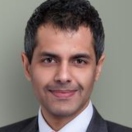Mr Nicholas Khan QC – European Commission Legal Service
 Nicholas Khan QC was one of two employed advocates appointedto silk in the 2017 competition, and the first lawyer to be appointedwhile working in a European Union institution. Nicholas was calledto the Bar in 1983 and has practised almost exclusively in the fieldof European law, both in private practice at the Bar in London andfor many years now as a member of the legal service of theEuropean Commission. He has worked on a wide range of subjectsbut in recent years his work has principally been in the field ofcompetition law, advising on and defending decisions involving household names (e.g.Microsoft, Intel and Google), often entailing “phenomenally large sums of money” from thefines imposed and the damages claims that are likely to ensue.
Nicholas Khan QC was one of two employed advocates appointedto silk in the 2017 competition, and the first lawyer to be appointedwhile working in a European Union institution. Nicholas was calledto the Bar in 1983 and has practised almost exclusively in the fieldof European law, both in private practice at the Bar in London andfor many years now as a member of the legal service of theEuropean Commission. He has worked on a wide range of subjectsbut in recent years his work has principally been in the field ofcompetition law, advising on and defending decisions involving household names (e.g.Microsoft, Intel and Google), often entailing “phenomenally large sums of money” from thefines imposed and the damages claims that are likely to ensue.
Nicholas said that a “happy chapter of accidents” had put him on his particular and ratherunusual career path. After studying law at Southampton University, at his tutor’s suggestion,Nicholas applied successfully to become a stagiaire (trainee) in the European Commission’sIndustry Directorate, working for six months on EU copyright laws. He did this after his firstsix months of pupillage at a Chancery set, and although one cannot directly obtain apermanent post from being a stagiaire, it provides experience of working life in Brussels andis frequently the launch pad to an EU career.
Following his ‘stage’ Nicholas returned to London to do his second six months’ pupillage in aLondon copyright set, but no tenancy was available at the end of it. He returned to Brussels,working in a small law firm, during which time he sat the Commission’s entrance examinationfor young lawyers, but remained focused on the Bar, securing a third six months in a Londonset. He was just on the point of being taken on by chambers when he learned that he hadbeen successful in the written stages of the Commission’s entrance exam; only the interviewremained – a long process! Presented with the dilemma of which opportunity to follow, withthe assurance of being able to return to the set if he later wanted to, Nicholas took up aposition as a lawyer at the Department of Trade and Industry, which was invaluableexperience in preparing for the final interview and, on passing, being an attractive candidatefor recruitment to the Commission
Initially, Nicholas worked on infringements of environmental Directives, which he said,provided extremely useful experience of dealing with an entirely new area of law to him andlearning how the Commission machine operated. Still keen on advocacy however, Nicholassecured a move into the Commission’s central legal service. This he compared with theUK’s Government Legal Service, but with one vital difference: unlike the UK government, theEU uses its own in-house advocates. This exposed Nicholas to a wide range of work, fromsocial security coordination, free movement of persons and sex discrimination to state aidand anti-dumping investigations. He relished this work as it entailed questions of law at ahigh level – one of his early opponents in court being a young David Pannick. The cases hedealt with became steadily more legally and factually complex and demanding, frequentlyfeaturing Member States and huge multi-national companies like BA and Air France.
After ten years, Nicholas returned to practice in Blackstone Chambers in London at the endof 1999. Highpoints during his period in Blackstone Chambers included two House of Lordscases, one as junior to the “fabulously eloquent” Michael Beloff QC and another where hedid much of the oral argument and was faced with five Law Lords “firing off questions” athim. However, the workflow was patchy and Nicholas remained concerned that he was notreceiving much assistance in developing his practice, so after some three years in London,he took up the offer to return to the Commission’s Legal Service, in 2003. Having gotmarried at about that time, Nicholas and family put down roots in Brussels, where Nicholas has continued to build his career, initially working on state aid matters, and more recentlycompetition.
In Nicholas’s view, one of the great attractions of being an employed barrister working for theEU, is that one never has to go “running after work” and that it is inherent to an area likecompetition law at EU level that the cases are demanding and important – more often thannot involving novel points of law, such as his current cases about Google’s dominance overvarious internet related markets. His cases also provided occasional opportunities to appearin the national courts, such as in important state aid and competition cases, where theCommission has a right to intervene. Appropriately enough, Nicholas’s first courtappearance since becoming a QC was before the Master of the Rolls, intervening in a seriesof appeals about the interpretation of a Commission decision regarding MasterCard’sinterchange fees.
Nicholas first thought about applying for QC when he began to find himself frequently upagainst QCs. He therefore looked into the silk application process and was pleased to seethat assessments from foreign jurisdictions and courts like those of the EU Institutions wereadmissible. Nicholas said that the QC appointment process was so much better than the old‘tap on the shoulder’ system which it had replaced and which had lost much credibility in theperiod before it was suspended. The new process was more transparent and objective,although also extremely demanding. Nicholas had also noted that the operation of the QCcompetition had become more open to people with unusual practices, notably in terms of therange of eligible assessors. The possibility to rely on assessments from judges in theEuropean Courts was indispensable for his application.
The application process was formidable. Nicholas had no difficulty in identifying twelvecases that met the scheme’s definition of substantial, but he would have appreciated a littlebit more space on the application form to describe them, given that his practice was out ofthe mainstream. You needed to be careful to ensure every word used advances yourapplication, he said. Having the necessary cases of substance provided invaluable readacross to the ‘understanding and using the law’ competency. Similarly it was not difficult tofind the evidence for written advocacy, as the EU judicial system relies heavily on writtensubmissions. However, convincing the QC Selection Panel that his oral advocacy met thecriteria for excellence in the higher courts of England and Wales was more of a challenge,which he was able to meet by emphasising the importance placed by the EU Courts at oralhearings on putting questions to the parties.
Working in the EU institutions, in Nicholas’s experience, tended to be of a much morecollaborative nature than working in chambers. This meant that he was well placed toprovide the necessary evidence which the Selection Panel sought as regards the ‘workingwith others’ competency. Similarly, working with colleagues from 27 other member statesmeant that Nicholas had made diversity (another competency) “part-and-parcel” of hisapproach to work. So much so in fact that he “had to stand back” and distil for the Panel notjust his views and knowledge on the subject but also what he had proactively done to valueand encourage diversity. In contrast, Nicholas felt that working in chambers with similarpeople, although a “comfortable” environment (“people understood your jokes”) couldperhaps militate against dealing with and valuing difference.
As regards his preparation for the silk interview, Nicholas said that he had had the benefit ofhaving had other competency-based interviews during his career in the EU. But he stillneeded to focus fully on the competencies, and in the build-up to his interview he had gonecarefully over his application form to crystallise the aspects of his cases which demonstratedthe competencies. The interview was fairly short (no longer than 40 minutes) which meantthat not every aspect could be tested. In his interview, for example, there was little timedevoted to questions on the ‘understanding and using the law’ competency. He said that discussion flowed naturally from talking about his cases to, for example, working with others.The interviewers were skilled at drawing him out with probing questions. He considered thathe was given a fair hearing, although he would not go so far as some applicants whoclaimed to have “enjoyed” it! He did feel that – despite the guidance for applicantsemphasising that the interview was not in itself determinative of the outcome of theapplication – a great deal did hang on the interview. Nicholas appreciated the openingquestion about current cases, which eased him into the interview and gave the opportunity toupdate the interviewers on his practice.
Finally, asked what the QC ‘badge’ meant to Nicholas, he said that he was delighted for theCommission Legal Service that one of its own had been recognised with this prestigiousaccolade. On a personal level, Nicholas said that he finds he is sought out more bycolleagues working on other areas of EU law, wanting him to “moonlight” for them!
- Date: March 19, 2019
- Category: QCA Profiles 2018


